 A Cheap Death: How to Donate Your Body to ScienceWATCH SEGMENT ON KFOR-TV  If you’re looking to eliminate your funeral and burial costs, as well as help advance medical research, donating your body to science is a great option to consider. Each year, an estimated 20,000 Americans donate their whole body, after death, to medical facilities throughout the country to be used in medical research projects, anatomy lessons and surgical practice. After using your body, these facilities will then provide free cremation – which typically costs between $600 and $3,000 – and will either bury or scatter your ashes in a local cemetery or return them to your family, usually within a year or two. And, just in case you’re wondering, your family cannot be paid for the use of your body. Federal and state laws prohibit it. Here are a few other things you need to know and check into, to help you determine whether whole-body donation is right for you: Acceptance rules: Most body donation programs will not accept bodies that are extremely obese, or those that have infectious diseases like hepatitis, tuberculosis, H.I.V. or MRSA. Bodies that suffered extensive trauma won’t be accepted either. Organ donation: Most programs require that you donate your whole body in its entirety. So if you want to be an organ donor (with the exception of your eyes), you won’t qualify to be a whole body donor too. Special requests: Most programs will not allow you to donate your body for a specific purpose. You give them the body and they decide how to use it. Memorial options: Most programs require almost immediate transport of the body after death, so there’s no funeral. If your family wants a memorial service they can have one without the body. Body transporting: Most programs will cover transporting your body to their facility within a certain distance. What To Do In Oklahoma, your two options are The University of Oklahoma Health Sciences Center Willed Body Program in Oklahoma City (OUmedicine.com, 405-271-2424, ext. 0), and the Oklahoma State University Center for Health Sciences Body Donor Program in Tulsa (918-561-8253). Once you decide on a program, call and ask them to mail you an information/registration packet that will explain exactly how their program works. To sign up, you’ll simply need to fill out a couple of forms. But, you can always change your mind if you wish. After you have made arrangements, you then need to tell your family members so they will know what to do and who to contact after your death. It’s also a good idea to tell your doctor and your local funeral director, and put your wishes in writing in your advance directives.
|




